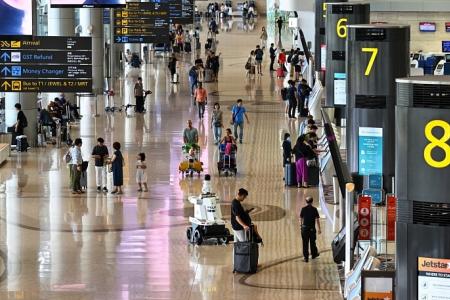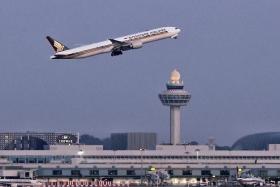Changi Airport’s 2024 passenger traffic hit 99.1% of pre-pandemic levels
Changi Airport handled 67.7 million passengers in 2024, which is 99.1 per cent of pre-pandemic levels in 2019 and just shy of a full recovery.
This was a 14.8 per cent increase from the 58.9 million passengers who passed through the airport in 2023, said operator Changi Airport Group (CAG) on Jan 22.
In 2019, the airport registered 68.3 million passenger movements.
December was the busiest month of 2024 for Changi Airport, with 6.41 million passengers passing through. This is on a par with passenger traffic levels in December 2019.
It was also the first time that monthly traffic at the airport had exceeded six million since December 2019.
CAG said the busiest day of 2024 was Dec 21 – the Saturday before Christmas – when Changi Airport received 226,000 passengers.
On the whole, the airport handled 17.8 million passengers in the last quarter of 2024. This was a 10.7 per cent increase from the fourth quarter of 2023 and a full recovery to traffic levels in the fourth quarter of 2019 (also 17.8 million passengers).
About 366,000 flights took off from or landed at Changi Airport in 2024, up from 328,000 in 2023. The airport handled 382,000 flights in 2019.
While all regions that the airport is connected to grew in terms of passenger traffic, CAG noted that North Asia was the fastest-growing region in 2024. The region recorded a 40 per cent increase in passenger traffic from 2023.
China was Changi Airport’s biggest market in 2024 by passenger traffic, climbing to first place after ranking sixth in 2023.
Behind it were Indonesia, Malaysia, Australia and Thailand.
The busiest routes for Changi Airport in 2024 were to and from Kuala Lumpur in Malaysia, Bangkok in Thailand, Jakarta and Bali (Denpasar) in Indonesia, and Hong Kong.
Changi Airport handled 1.99 million tonnes of airfreight in 2024, up 14.6 per cent from 1.74 million tonnes in 2023.
CAG attributed this growth to major improvements in cargo flows between Singapore and China as well as the United States, in addition to the recovery of Singapore’s electronics exports and re-exports.
Other contributing factors were the strong global demand for cross-border e-commerce shipments and the shift from ocean to airfreight because of disruptions in maritime transport.
Changi Airport’s top five air cargo markets were China, Australia, the US, Hong Kong and India.
In 2024, eight new passenger airlines began flying to and from Changi Airport. They are East Timor’s national carrier Aero Dili, AirAsia Cambodia, Air Canada, budget carrier Air Japan, Chinese airline Loong Air, Japanese low-cost carrier Peach Aviation, Chinese carrier Tianjin Airlines and Chinese low-cost airline West Air.
Changi Airport added 11 new cities to its network in 2024. They are Broome in Australia, Brussels in Belgium, Kertajati in Indonesia, Melaka in Malaysia, Phu Quoc in Vietnam, Vancouver in Canada, and Guiyang, Lhasa, Linyi, Quanzhou and Wenzhou in China.
In addition, the airport is now linked to Gatwick Airport in London and Subang Airport in Kuala Lumpur, providing travellers with more options when flying to and from these cities.
Two new freighter airlines, which carry goods in bulk, also began services to Singapore in 2024. They are China’s Shandong Airlines, which flies between Shenzhen and Singapore, and South Korea’s Air Incheon, which operates the Seoul to Singapore route with a stop in Haikou, China.
As at January 2025, 100 airlines are operating more than 7,400 weekly scheduled flights at Changi Airport, linking Singapore to 163 cities in 49 countries and territories around the world.
This is close to the scale of the airport’s network in January 2020, when more than 100 airlines ran about 7,400 weekly scheduled flights, linking Singapore to more than 170 cities in about 50 countries.
In the mid-2030s, when the mega Changi Airport Terminal 5 is operational, the aim is for Singapore to be linked by air to more than 200 cities.
New routes are also on the horizon. From March, budget airline Jetstar Asia will start flights to Labuan Bajo in Indonesia, and low-cost carrier Scoot will operate non-stop flights between Singapore and Vienna in Austria from June.
Transport Minister Chee Hong Tat said the authorities are confident that Changi Airport will continue its strong growth momentum and that traffic volumes will exceed pre-Covid-19 levels in 2025.
“The strong recovery of our air hub is only possible through the strong commitment and contributions of our aviation workers and airline partners,” Mr Chee wrote on Facebook on Jan 22.
“I am proud that our aviation sector has emerged more united, resilient and ready for the future.”
CAG chief executive Yam Kum Weng said he is optimistic about another year of growth in passenger traffic in 2025.
He added that CAG will continue investing in Changi Airport’s infrastructure, systems and processes, so as to beef up its handling capacity to support rising air travel demand in the years ahead.
Changi Airport was the world’s fourth-busiest international airport in 2024 by airline seat capacity, based on figures from global travel data provider OAG Aviation released on Jan 15.
It came in behind Dubai International Airport, London’s Heathrow Airport and Seoul’s Incheon Airport.
Get The New Paper on your phone with the free TNP app. Download from the Apple App Store or Google Play Store now


